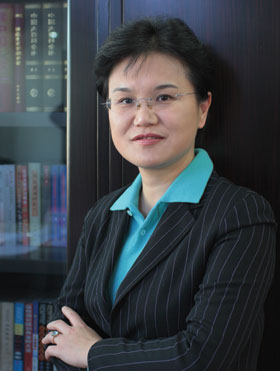

Seaweed, known primarily as a healthy appetizer served in Japanese restaurants, can also be a healthy fertilizer for crops and vegetables.
The first company engaged in research and development (R&D) of seaweed extract fertilizers in China, Beijing Leili Agrochemistry has developed into the largest manufacturer of seaweed extract in Asia, with revenue of $30 million per year.
"We are bringing benefits from the ocean back to the earth," says Tang Jie, Leili's founder and general manager.
 Tang Jie |
Tang first discovered a market for seaweed fertilizer 13 years ago at an overseas exhibition.
Established in 1993, Leili began as a chemical fertilizer business. When Tang attended an agricultural exhibition in Australia in 1994, she found that people in developed countries cared more about the environment and preferred to use organic fertilizers, such as seaweed extract.
But at that time, there was no seaweed extract fertilizer in the Asian market. Tang took it as an opportunity, and saw future promise for seaweed fertilizer.
When Tang came back to China, she established an R&D center for seaweed fertilizers and invited top agricultural specialists from the Chinese Academy of Agricultural Sciences (CAAS) to join the team.
After four years' toiling with research, the company's first seaweed product called seaweed nutrient extract liquid was awarded by the Ministry of Agriculture as a scientific and technological achievement.
But Leili ran into roadblocks when it tried to tackle the overseas markets.
At that time, Rockweed from the cold North Atlantic Ocean was recognized as the only source for good qualified seaweed fertilizers in the European and US markets, Tang tells China Business Weekly.
So how to shake out the old thinking toward seaweed sources was a big problem for her.
It took time for her company to be recognized by overseas markets, Tang recalls.
Tang collected wild harvested sargassum and laminaria from the South China Sea and the Philippines, and set about proving that they were good enough to be qualified as sources for seaweed fertilizers.
She frequently attended overseas agriculture exhibitions, invited specialists to test their products and sent samples to customers.
After another four years' promotion, the company's products were widely recognized by overseas markets, and in 2002 its seaweed extract powder obtained the first registration certificate by Institute for Marketecology in Switzerland in 2002.
Leili now ranks in the top five most recognized global brands according to New AG International, a UK-based agricultural magazine. More than 80 percent of its seaweed fertilizers is exported to more than 40 countries.
Leili's seaweed fertilizers entered into domestic market in 2003, and the company now holds 50 percent market share.
Tang says the company decided to attack overseas markets first due to market demand and higher prices compared to chemical fertilizers, but she felt it was important to bring the environmental friendly idea to China.
"Most Chinese farmers do not know how to properly use fertilizers," says Zhao Bingqiang, a professor from CAAS. "Blindly seeking quantities of production, they usually overuse chemical fertilizers.
"This could destroy nitrogen-fixing bacteria and effect plant health. Furthermore, it may pollute soil and water."
But inorganic fertilizers are needed to meet food needs of a growing population since organic sources are usually low in nutrient content but can improve a product's natural taste. Therefore, combined inorganic and organic fertilizer can both improve soil fertility, and production quality.
Tang believes her products combining inorganic and organic sources are good to both farmers and the environment.
In 2003, Tang set up Leili Green Fertilizers Management Chain, which is aimed at wholesale and retail for rural areas in China.
"For specialty agricultural products, it is necessary to provide Chinese farmers with a series of services. Therefore we launch new products annually according to the demands of the agricultural production," Tang says.
Leili sent agricultural supervisors to rural areas and provided farmers with scientific fertilization services adjusted for different crops.
Now the company has expanded its chain business into 150 retail shops, and expects to increase the number to 500 by 2010.
"I hope my efforts will make the world a little bit greener," Tang says.
(China Daily 01/14/2008 page7)













